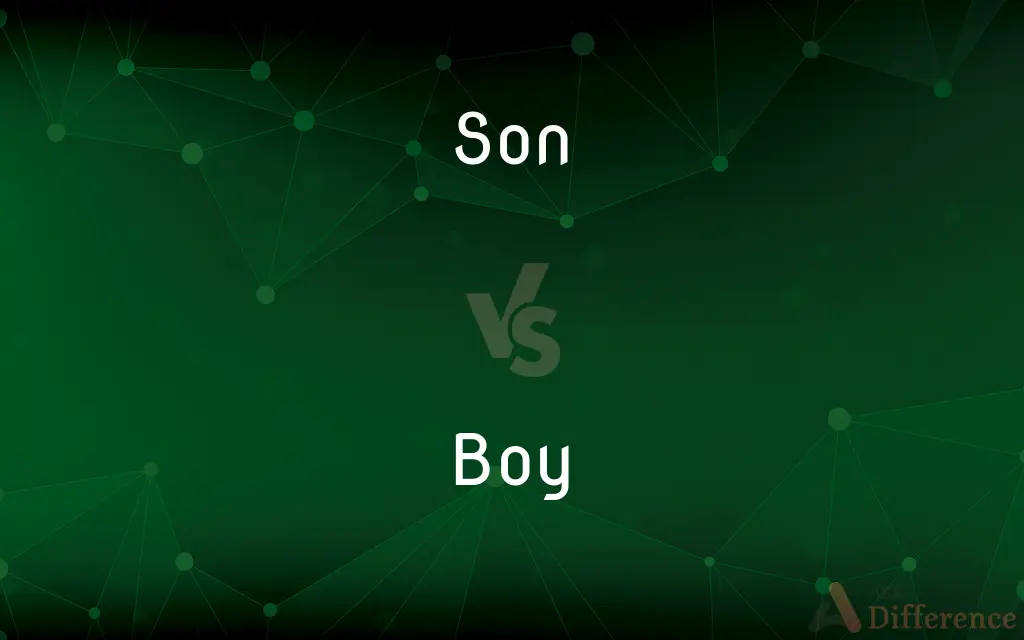Son vs. Boy — What's the Difference?
By Fiza Rafique & Urooj Arif — Updated on March 12, 2024
A son is a male offspring in relation to his parents, while a boy is a young male human, typically before reaching grown age.

Difference Between Son and Boy
Table of Contents
ADVERTISEMENT
Key Differences
The term "son" specifically denotes a familial relationship, indicating a direct biological or legal connection to one or more parents. It emphasizes the bond within a family unit, regardless of the son's age. A "boy," however, refers to the gender and age of a male individual, usually implying youth and the period before reaching maturity. This term is not limited by family relationships and can be used to describe any young male.
While a son remains a son regardless of age, embodying a permanent role within a family, the designation of "boy" is temporary, transitioning to "man" as the individual grows older. The concept of being a son is defined by parentage and kinship, whereas being a boy is defined by age and gender.
The relationship between a parent and a son carries legal and social responsibilities and rights, such as inheritance, care, and emotional bonds. In contrast, the term "boy" does not inherently include such responsibilities and rights, focusing instead on the individual's stage of life.
Culturally and emotionally, the term "son" can evoke a sense of lineage, legacy, and familial duty, highlighting the continuation of family lines and values. "Boy," on the other hand, often conjures images of youth, playfulness, and the process of growth and learning, without the direct implication of familial obligations.
Son centers on a familial and relational identity, deeply rooted in kinship and legal structures, while "boy" describes a stage in the lifecycle of a male, emphasizing age and the process of maturation rather than familial connections.
ADVERTISEMENT
Comparison Chart
Definition
Male offspring in relation to his parents
Young male human, typically before grown-up
Key Focus
Familial relationship and kinship
Age and gender
Implications
Permanent role within a family
Temporary stage of youth and growth
Responsibilities/Rights
Legal and social, tied to family relations
None inherently tied to the term
Cultural/Economic Emotion
Lineage, legacy, familial duty
Youth, playfulness, growth
Compare with Definitions
Son
A male child of one's parents.
Their son just graduated from college.
Boy
A male child or teenager, before reaching grown age.
The boy was playing in the park.
Son
Can denote a male child adopted into a family.
Their adopted son was welcomed with open arms.
Boy
Can imply immaturity or inexperience, regardless of age.
He acted like a boy during the meeting.
Son
Can be used affectionately for a younger male by a significantly older individual.
The elderly man referred to the helpful teenager as son.
Boy
Describes a young male in terms of behavior or appearance.
He has a boyish charm even in his thirties.
Son
In legal contexts, refers to a male offspring with inheritance rights.
The will was contested by the deceased's sons.
Boy
In historical or traditional contexts, referred to male servants or apprentices.
The carpenter took the boy as his apprentice.
Son
A male descendant in a family line.
He is the fourth son to carry the family name.
Boy
Used in various phrases to express surprise or emotion.
Oh boy, that was a close call!
Son
A son is a male offspring; a boy or man in relation to his parents. The female counterpart is a daughter.
Boy
A boy is a young male human. The term is usually used for a child or an adolescent.
Son
One's male child.
Boy
A male child.
Son
A male descendant.
Boy
A son
His youngest boy.
Son
A man considered as if in a relationship of child to parent
A son of the soil.
Boy
Often Offensive A man, especially a young man.
Son
One personified or regarded as a male descendant.
Boy
(Informal) A man socializing in a group of men
A night out with the boys.
Son
Used as a familiar form of address for a young man.
Boy
(Offensive) A male servant or employee.
Son
Son(Christianity) The second person of the Trinity.
Boy
Used to express mild astonishment, elation, or disgust
Oh boy—what a surprise!.
Son
One's male offspring.
Before the birth of the man's child, he said: "I want a son, not a daughter."
Boy
A young male.
Kate is dating a boy named Jim.
Son
A male adopted person in relation to his adoptive parents.
Boy
(diminutive) A son of any age.
Son
A male person who has such a close relationship with an older or otherwise more authoritative person that he can be regarded as a son of the other person.
Boy
A male of any age, particularly one rather younger than the speaker.
Son
A male person considered to have been significantly shaped by some external influence.
He was a son of the mafia system.
Boy
(obsolete) A male of low station, (especially as pejorative) a worthless male, a wretch; a mean and dishonest male, a knave.
Son
A male descendant.
The pharaohs were believed to be sons of the Sun.
Boy
A male servant, slave, assistant, or employee, particularly:
Son
A familiar address to a male person from an older or otherwise more authoritative person.
Boy
A younger such worker.
Son
An informal address to a friend or person of equal authority.
Boy
A non-white male servant regardless of age, particularly as a form of address.
Son
(computing) The current version of a file, derived from the preceding father file.
Boy
(obsolete) A male camp follower.
Son
(music genre) Son cubano, a genre of music and dance blending Spanish and African elements that originated in Cuba during the late 19th century.
Boy
Any non-white male, regardless of age.
Son
(transitive) To produce (i.e. bear, father, beget) a son.
Boy
A male animal, especially, in affectionate address, a male dog.
C'mere, boy! Good boy! Who's a good boy?
Are you getting a boy cat or a girl cat?
Son
(transitive) To address (someone) as "son".
Boy
A former low rank of various armed services; a holder of this rank.
Son
A male child; the male issue, or offspring, of a parent, father or mother.
Sarah conceived, and bare Abraham a son.
Boy
Heroin.
Son
A male descendant, however distant; hence, in the plural, descendants in general.
I am the son of the wise, the son of ancient kings.
I am the Lord, I change not; therefore ye sons of Jacob are not consumed.
Boy
A male (tree, gene, etc).
Son
Any young male person spoken of as a child; an adopted male child; a pupil, ward, or any other young male dependent.
The child grew, and she brought him unto Pharaoh's daughter, and he became her son.
Be plain, good son, and homely in thy drift.
Boy
Exclamation of surprise, pleasure or longing.
Boy, that was close!
Boy, that tastes good!
Boy, I wish I could go to Canada!
Son
A native or inhabitant of some specified place; as, sons of Albion; sons of New England.
Boy
(transitive) To act as a boy in allusion to the former practice of boys acting women's parts on the stage.
Son
The produce of anything.
Earth's tall sons, the cedar, oak, and pine.
Boy
A male child, from birth to the age of puberty; a lad; hence, a son.
My only boy fell by the side of great Dundee.
Son
Jesus Christ, the Savior; - called the Son of God, and the Son of man.
We . . . do testify that the Father sent the Son to be the Savior of the world.
Who gave His Son sure all has given.
Boy
In various countries, a male servant, laborer, or slave of a native or inferior race; also, any man of such a race; - considered derogatory by those so called, and now seldom used.
He reverted again and again to the labor difficulty, and spoke of importing boys from Capetown.
Son
A male human offspring;
Their son became a famous judge
His boy is taller than he is
Boy
To act as a boy; - in allusion to the former practice of boys acting women's parts on the stage.
I shall seeSome squeaking Cleopatra boy my greatness.
Son
The divine word of God; the second person in the Trinity (incarnate in Jesus)
Boy
A youthful male person;
The baby was a boy
She made the boy brush his teeth every night
Most soldiers are only boys in uniform
Boy
A friendly informal reference to a grown man;
He likes to play golf with the boys
Boy
A male human offspring;
Their son became a famous judge
His boy is taller than he is
Boy
(ethnic slur) offensive term for Black man;
Get out of my way, boy
Common Curiosities
Does the term "son" imply age?
No, a son can be of any age, as it emphasizes the relationship to the parents.
Can the term "boy" be used for elders?
It can be used informally or affectionately for young males, often implying youthfulness or inexperience.
What legal rights does a son have?
Legal rights can include inheritance, decision-making in family matters, and others, depending on the jurisdiction.
Are all boys sons?
In a biological or adoptive sense, yes, but "boy" is used more broadly to refer to male youth in general, not just in relation to their parents.
Can a boy be called a son?
Yes, if he is the male offspring of parents, he is both a boy (by age) and a son (by familial relation).
How do cultural norms affect the perception of sons and boys?
Cultural norms influence expectations, responsibilities, and the transition from boyhood to manhood, as well as the value placed on familial relationships.
Does being a son or a boy impact one's identity?
Yes, both terms can significantly shape an individual's social identity and personal development, though in different aspects and stages of life.
Is the emotional bond between a parent and a son different from that with a boy?
The bond with a son is defined by a familial connection, which can add layers of responsibility and affection not inherently present in the broader term "boy."
How does society view the roles of sons and boys?
Societal views vary, but generally, sons carry expectations of lineage and familial duty, whereas boys are seen in light of their development and potential.
How do responsibilities differ between sons and boys in a family context?
Sons may have specific familial duties and inheritances, while "boy" describes their age and development stage without specific duties.
Share Your Discovery

Previous Comparison
Traffic vs. Tailback
Next Comparison
Betrothal vs. EngagementAuthor Spotlight
Written by
Fiza RafiqueFiza Rafique is a skilled content writer at AskDifference.com, where she meticulously refines and enhances written pieces. Drawing from her vast editorial expertise, Fiza ensures clarity, accuracy, and precision in every article. Passionate about language, she continually seeks to elevate the quality of content for readers worldwide.
Co-written by
Urooj ArifUrooj is a skilled content writer at Ask Difference, known for her exceptional ability to simplify complex topics into engaging and informative content. With a passion for research and a flair for clear, concise writing, she consistently delivers articles that resonate with our diverse audience.















































